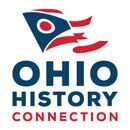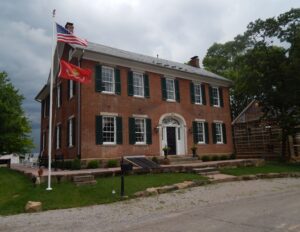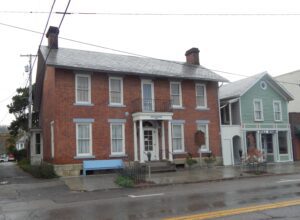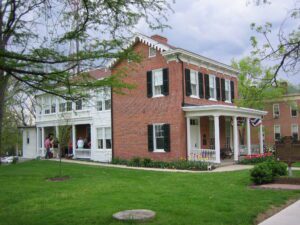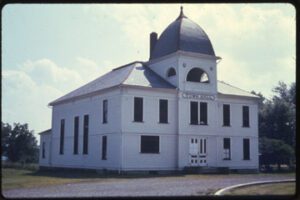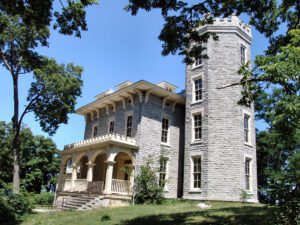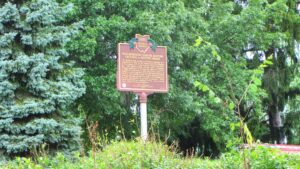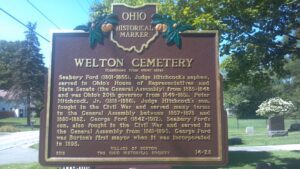, OH
Erected in 1828, the Randolph Mitchell House is a five-bay, Federal-style “I” house. Its facade features a doorway with an Adam-style fan and sidelights. The interior boasts a grand stairway in the foyer and fine woodwork throughout. Randolph Mitchell (1796-1847) was born in Rockingham County, Virginia. In 1819, Mitchell and his mother Sarah (1765-1844), settled in New Reading and he married Lydia Witmer (1798-1872). They had four children. A merchant, Mitchell kept an ample smokehouse and owned a tannery and real estate. He served as a justice of the peace for Reading Township. After Mitchell’s death, his son-in-law, Dr. W.W. Arnold (1818-1872) maintained his practice in the home, where he and Caroline Mitchell Arnold (1825-1888) lived. Their son William Arnold (1858-1948) acquired the house, which remained in the family until 1951. The property was listed on the National Register of Historic Places in 1978.
, OH
This brick, Federal-style house was built in 1836. Helen Moore, the grand daughter of General Robert McConnel, officer during the War of 1812 and founder of McConnelsville, married Dr. Hiram L. True and made their home here. Dr. True practiced medicine in the area and was widely known for his interest in science, serving as president of the local Scientific Society. Their daughter Evelyn True Button was born in the house in 1875. A graduate of Ohio Wesleyan University, Evelyn traveled to the Philippines in 1898 on a missionary trip to train teachers. A teacher, principal, community leader, and ardent worker for women’s rights, she died in the place of her birth in 1975. She bequeathed the house to the Morgan County Historical Society to serve as a depository of furnishings and artifacts of Morgan County heritage.
, OH
William Holmes McGuffey (1800-1873) was a Miami University faculty member in 1836 when he compiled the first edition of the McGuffey Eclectic Reader in this house. His Reader taught lessons in reading, spelling, and civic education by using memorable stories of honesty, hard work, thrift, personal respect, and moral and ethical standards alongside illustrative selections from literary works. The six-edition series increased in difficulty and was developed with the help of his brother Alexander Hamilton McGuffey. After the Civil War the Readers were the basic schoolbooks in thirty-seven states and by 1920 sold an estimated 122 million copies, reshaping American public school curriculum and becoming one of the nation’s most influential publications. (Continued on other side)
, OH
Major buildings dating from 1832 to 1898 surround the village green, the geographic center of Gustavus Township. Built in 1832 on the northwest quadrant, the George Hezlep House features Federal-Greek Revival architecture and has a closet reputedly used on the Underground Railroad. Built in 1840, the Farmers’ Exchange Store was originally a double entrance Greek Revival structure. The Storekeeper’s House, also a Greek Revival structure, was built next to the exchange store in 1840. South of this house is the Fraternal Hall, built in 1870. There were once four churches in Gustavus including the Methodist Church, built in 1856 with a temple front and a belfry, and the Congregational Church, built east of the center in 1854. The eclectic Town Hall was built in 1890 and fronts the southeast quadrant. The Gustavus Centralized School, reported as the first centralized school in the United States, was built in 1898 and was replaced by the current building in 1928.
, OH
Completed in 1865, this home was the vacation retreat of Jay Cooke and his family. Known as the “financier” for the Union states during the Civil War, Cooke organized a program to sell millions of dollars worth of bonds to support the war effort. The house is of a high Victorian Italianate mode with a Gothic style tower topped with crenellations. Distinctive hood moldings outline windows and over-scaled and ornamental brackets support crowning cornices. The house, commonly known as Cooke Castle, hosted many notables of the time, including William T. Sherman, William Howard Taft, Rutherford B. Hayes, Salmon Chase, and John Brown, Jr. Born in Sandusky in 1821, Cooke, an avid fisherman, acquired the island for $3,001 in 1864. University trustee Julius Stone gave the island to The Ohio State University in 1925. The house was placed on the National Register of Historic Landmarks in 1966.
, OH
The house of Ebenezer Zane was built here in 1805. The structure was the meeting place for the First Methodist Quarterly Conference in 1819 where over 300 settlers in the area and about sixty members of the Wyandot tribe came together. Although the cabin was reconstructed in 1997, it is a symbol of harmonious relations between American settlers and the Wyandot in the years before the latter’s removal from Ohio in 1842.
, OH
The Marlborough Society of Friends Meeting was established in 1813 by the Salem Quarterly Meeting at the request of the Springfield (Damascus) Meeting. The Marlborough Friends and Lexington Friends combined to become the Alliance Friends in 1865 and relocated to 322 East Perry Street in Alliance, which was the site of a Methodist Episcopal Church. The Marlborough Friends Meeting House and the burying ground were sold to W.W. Holibaugh in 1897 and remain in private ownership. When State Route 619 was widened in 1941, some burials were exhumed and re-interred
, OH
Welton Cemetery was known as Roselawn Cemetery until the early 1900s. Early settlers to the Burton area donated the land. Welton Cemetery is the burial place for veterans of the nation’s wars and for several state officials. Judge Peter Hitchcock (1781-1853) served in the War of 1812. From 1810-1852, he was elected to both houses of Ohio’s General Assembly and one term in the U.S. House of Representatives and served on the state’s Supreme Court. He was Chief Justice from 1831-1833 and 1849-1851. In 1850, he was a member of Ohio’s constitutional convention. (Continued on other side)

